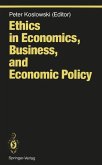The book presents the basic models of the most important economic agents (households, firms, the banking system etc.). The influence of ethics on the decisions of persons is discussed within the context of mutual influences of one person on another. It is shown that this leads to a Markov chain which converges to a final situation which in many cases is independent of the initial conditions. Different types of decisions are considered: those in personal life, those on the general political and economics constitution and on the current economic policy, and those of normal economic routine (consumption, investment etc.). The reverse influence is treated as well: that of the economic influence on ethics. In the first volume, the conceptual basis of the whole system is laid. The book helps the reader to understand the interdependence of humanities and economics and how to model this interdependence in economics.
When one gets older, one looks at the science in which one has been working for a long time from a certain distance such that the general approach, the contours of the whole and the connections to other parts of the social sciences come to the foreground whereas the elaboration of the details must be left to younger colleagues. This applies also to this book: details are left to younger colleagues - if they find it worthwhile to try this new approach. I know quite well that the ideas presented here are incomplete and more in the spirit of a research program than a final product in itself. But time runs out. I personally think that this new road is worthwhile trying, but, of course, I, as the author, am not unprejudiced. On the other hand, after a certain age one is not so sensible to be torn to pieces by his critics, nature will do that anyway. I present here only the basic ideas, the "hard core" of the theory and leave out most of the definitional relations which close the system. I leave that to the interested reader and to the scholar who wants to work with the system. There are some repetitions in the book.
Hinweis: Dieser Artikel kann nur an eine deutsche Lieferadresse ausgeliefert werden.
When one gets older, one looks at the science in which one has been working for a long time from a certain distance such that the general approach, the contours of the whole and the connections to other parts of the social sciences come to the foreground whereas the elaboration of the details must be left to younger colleagues. This applies also to this book: details are left to younger colleagues - if they find it worthwhile to try this new approach. I know quite well that the ideas presented here are incomplete and more in the spirit of a research program than a final product in itself. But time runs out. I personally think that this new road is worthwhile trying, but, of course, I, as the author, am not unprejudiced. On the other hand, after a certain age one is not so sensible to be torn to pieces by his critics, nature will do that anyway. I present here only the basic ideas, the "hard core" of the theory and leave out most of the definitional relations which close the system. I leave that to the interested reader and to the scholar who wants to work with the system. There are some repetitions in the book.
Hinweis: Dieser Artikel kann nur an eine deutsche Lieferadresse ausgeliefert werden.








